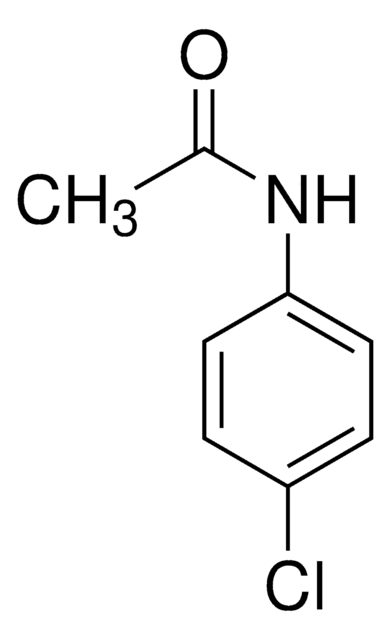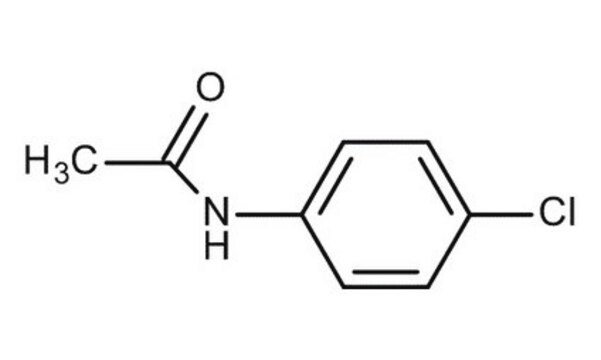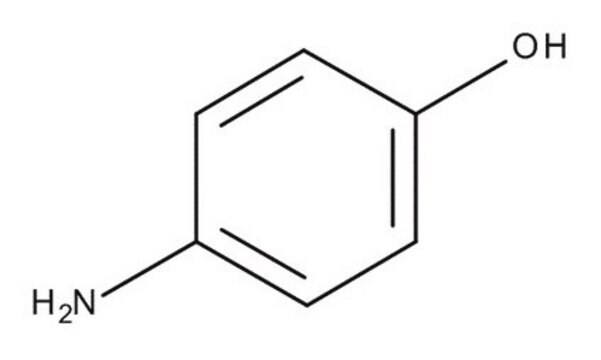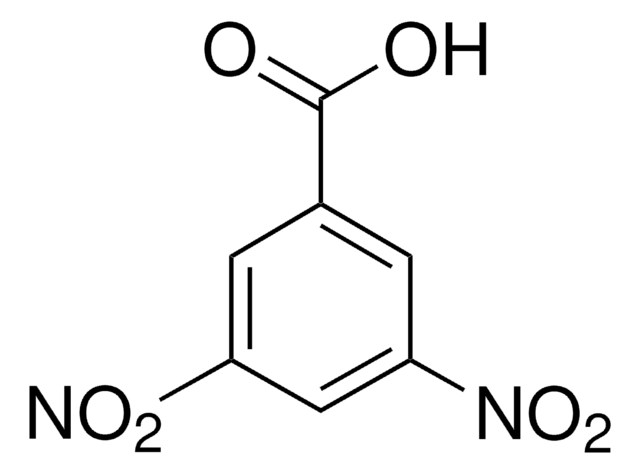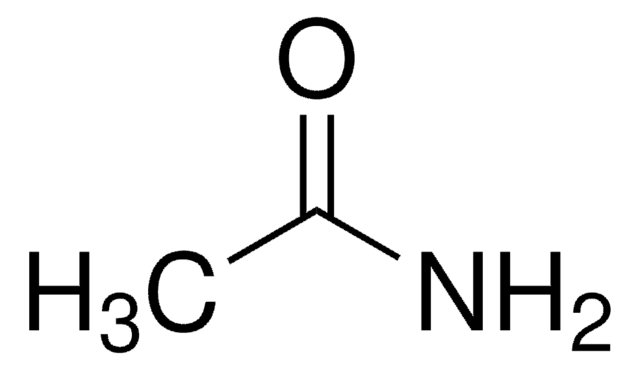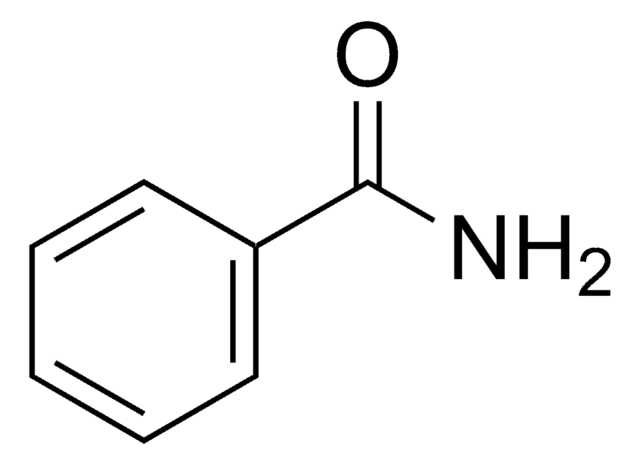158631
4′-Chloroacetanilide
97%
Synonym(s):
N-(4-Chlorophenyl)acetamide, Acetic acid 4-chloroanilide, NSC 40563, NSC 444
Sign Into View Organizational & Contract Pricing
All Photos(3)
About This Item
Linear Formula:
CH3CONHC6H4Cl
CAS Number:
Molecular Weight:
169.61
Beilstein:
509638
EC Number:
MDL number:
UNSPSC Code:
12352100
PubChem Substance ID:
NACRES:
NA.22
Recommended Products
Assay
97%
form
solid
mp
176-178 °C (lit.)
functional group
amide
SMILES string
CC(=O)Nc1ccc(Cl)cc1
InChI
1S/C8H8ClNO/c1-6(11)10-8-4-2-7(9)3-5-8/h2-5H,1H3,(H,10,11)
InChI key
GGUOCFNAWIODMF-UHFFFAOYSA-N
Looking for similar products? Visit Product Comparison Guide
Related Categories
General description
4′-Chloroacetanilide is the main impurity present in acetaminophen and has been quantitated by new high-performance liquid chromatography method using a mixed-mode reversed-phase/cation exchange stationary phase.
Application
<ul>
<li><strong>High-performance liquid chromatography (HPLC) method validation:</strong> 4 chloroacetanilide is used as an internal standard for isosorbide dinitrate in the assay of sustained-release tablets or capsules containing nitroglycerin, isosorbide dinitrate, or pentaerythritol tetranitrate by high-performance liquid chromatography (Gelber and Papas, 1983).</li>
</ul>
<li><strong>High-performance liquid chromatography (HPLC) method validation:</strong> 4 chloroacetanilide is used as an internal standard for isosorbide dinitrate in the assay of sustained-release tablets or capsules containing nitroglycerin, isosorbide dinitrate, or pentaerythritol tetranitrate by high-performance liquid chromatography (Gelber and Papas, 1983).</li>
</ul>
Signal Word
Warning
Hazard Statements
Precautionary Statements
Hazard Classifications
Eye Irrit. 2 - Skin Irrit. 2 - STOT SE 3
Target Organs
Respiratory system
Storage Class Code
11 - Combustible Solids
WGK
WGK 3
Flash Point(F)
Not applicable
Flash Point(C)
Not applicable
Personal Protective Equipment
dust mask type N95 (US), Eyeshields, Gloves
Choose from one of the most recent versions:
Already Own This Product?
Find documentation for the products that you have recently purchased in the Document Library.
Customers Also Viewed
Tamas A Godany et al.
Chimia, 65(4), 253-255 (2011-06-18)
Lithiation of N-(4-chlorophenyl)-pivalamide (NCP) and two additional substituted acetanilides: 4-fluoroacetanilide (4-F) and 4-chloroacetanilide (4-Cl) has been monitored by means of calorimetry, on-line ATR-IR and UV/vis spectroscopy and endoscopy. The combined on-line monitoring revealed the differences between the reaction paths of
L Koymans et al.
Xenobiotica; the fate of foreign compounds in biological systems, 23(6), 633-648 (1993-06-01)
1. The general mechanism of metabolic oxidation of substrates by cytochromes P450 (P450s) appears to consist of sequential one-electron oxidation steps rather than of a single concerted transfer of activated oxygen species from P450 to substrates. 2. In case of
Octavian Călinescu et al.
Journal of chromatographic science, 50(4), 335-342 (2012-03-13)
Determination of acetaminophen and its main impurities: 4-nitrophenol, 4'-chloroacetanilide, as well as 4-aminophenol and its degradation products, p-benzoquinone and hydroquinone has been developed and validated by a new high-performance liquid chromatography method. Chromatographic separation has been obtained on a Hypersil
Jody A Shoemaker et al.
Journal of AOAC International, 89(1), 201-209 (2006-03-04)
U.S. Environmental Protection Agency (EPA) Method 535 has been developed in order to provide a method for the analysis of "Alachlor ESA and other acetanilide degradation products," which are listed on EPA's 1998 Drinking Water Contaminant Candidate List. Method 535
Anthony F Pizon et al.
Clinical toxicology (Philadelphia, Pa.), 47(2), 132-136 (2008-07-09)
p-Chloroaniline is more potent at producing methemoglobin than aniline in animal models. This case highlights the clinical presentation of an inhalation exposure to p-chloroaniline and associated laboratory analysis. An in-vitro study evaluating the metabolism of p-chloroaniline in human hepatocytes was
Our team of scientists has experience in all areas of research including Life Science, Material Science, Chemical Synthesis, Chromatography, Analytical and many others.
Contact Technical Service
